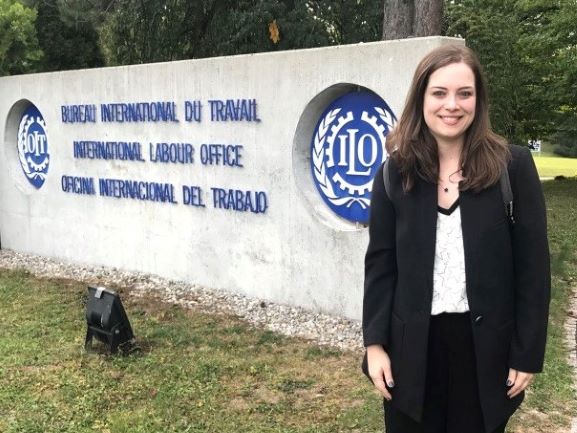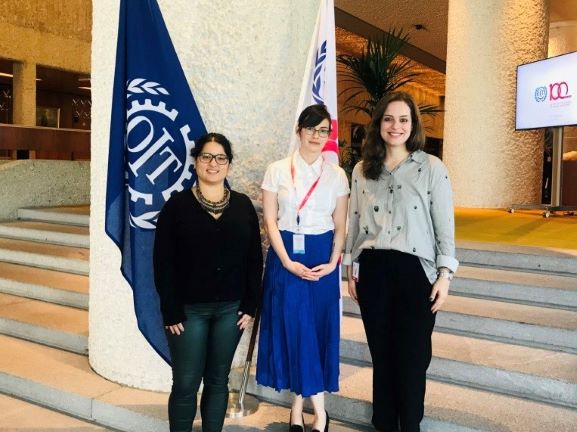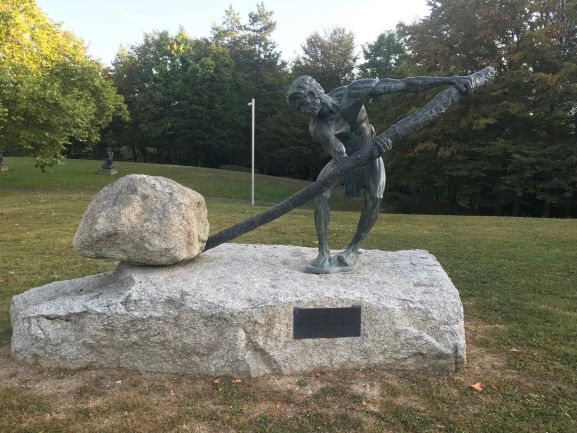Voices from the Sylff Community
Dec 11, 2019
Celebrating the International Labor Organization Centenary with a Conversation about Labor Standards, Health, and Safety at Work
Using an SRA award, Olívia de Quintana Figueiredo Pasqualeto, a 2019 Sylff fellow from the University of São Paulo, visited the International Labor Organization (ILO) in Geneva to discuss aspects of her doctoral thesis with specialists in international labor standards and collect bibliographical references on the subject that are not accessible from Brazil. In this article, she describes what motivated her to study the influence of international law on the protection of health and safety of workers and the application of Convention No. 155 of the ILO by labor courts in Brazil; the importance of the ILO visit and its contributions to her research; and the next steps to take after visiting the ILO.
* * *
Background and Motivations
The desire to understand how domestic law dialogues with international law originates in reflections on some of the results found in studies prior to my PhD research, especially during the conclusion of my master’s dissertation,[1] which showed that the programs, goals, and concepts set forth by the International Labor Organization on green jobs[2] are rarely observed by member states of the organization, as well as by institutions that handle the subject. Moreover, in my master’s research, I was able to find that occupational health and safety standards are most often breached in green jobs. From these conclusions came the question of the extent to which international law is applied in Brazil and influences the protection of health and safety at work.
To answer this proposed question, the object of study had to be delimited. I decided to study a specific international standard—ILO Convention No. 155 (C155), the first ILO convention that addressed health and safety at work generally, holistically, and preventively (ITCILO, 2018, p. 2)—and its application by the Brazilian labor courts (who exercise judicial power over labor subjects), since jurisdictional activity is one of the most concrete ways of giving effectiveness to international law (Valticos, 1955; Valticos, 1977; Potobsky, 2004). The idea is to analyze whether this international standard offers greater protection to worker health and safety and what the benefits are of applying it.
Considering the theme to be studied, it occurred to me to visit the ILO, the international body that prepared the C155, is responsible for monitoring its effectiveness, brings together great experts, and has the most specific bibliographic collection on the subject.
Visiting the ILO: An Opportunity to Dialogue with Experts and Deepen the Theoretical Framework
The proposed SRA project had two main objectives: to discuss with ILO experts the preliminary results of my research and to complement the bibliographic references of my thesis.
To achieve the first objective, a conversation was scheduled with some of the ILO’s legal officers from the International Labor Standards Department (NORMES). In this dialogue, I had the opportunity to ask the following questions: How can we make international labor standards more effective? Is judicial activity an important form to make it (more) effective? In Brazil, I perceive a certain lack of awareness about international labor standards (C155), including among judges; do you have the same impression, and does that make sense to you? This may not be exclusive to Brazil; what do you see in other countries? What are the advantages of using international labor standards (C155) in judicial decisions? How does the ILO plan to increase the use of Convention No. 155, what are the ways of bringing labor standards of the ILO closer to domestic law, and is there any strategy focused on jurisdictional activity?
My conversation with these experts was very productive. I was welcomed by three legal officers, and we debated the issues I had proposed for over two hours. Some of their answers reinforced and complemented some of the conclusions of my thesis, and an observation made by one of them helped me rework one of my research hypotheses. From this conversation, I structured and wrote the last chapter of the thesis, which is under review.
In addition, at the end of the conversation, one of the legal officers put me in contact with another important ILO department called the Labor Administration, Labor Inspection and Occupational Safety and Health Branch (LABADMIN/OSH), specializing in occupational health and safety, with which I was able to schedule another meeting that I had not initially foreseen. This second meeting was also very helpful, as we talked about the possibility of occupational health and safety being included in core labor rights.
It was highly important for the research to have this dialogue with people from outside my academic circle and have the opportunity to “test” the results that I have been finding. This helped me rethink some categorical statements I had made and indicated that the path I am tracing for the investigation is coherent.
Seeking to reach the second objective of my SRA project, I requested access to the ILO library, which allowed me not only to consult the library’s physical collection but also to use its space to study and write the thesis everyday while I was in Geneva. I was able to make a systematic collection of bibliographic material, having found works that are not available in Brazil. Being able to turn to these theoretical references—especially older books by Nicolas Valticos, Wilfred Jenks, and Georges Scelle—allowed me to complement the foundation of some ideas developed throughout the first and second chapters of the thesis, especially with regard to judicial use of ILO conventions. In addition to the theoretical framework, I had access to various historical documents regarding the approval of Convention No. 155 and ILO publications on occupational health and safety in general.
Next Steps
With the end of research abroad, I am finalizing the writing and review of the thesis, with the submission of my dissertation scheduled for December 2019 and graduation in March 2020.
In addition to completing the research, the ILO visit allowed me to structure two future projects: one originating from the meeting with LABADMIN/OSH, which opened a channel for material exchange and the possibility of developing a joint article in the future about “health and safety at work as a fundamental right and principle at work”; another directed to the publication of reviews (in Portuguese) of the works I consulted that are not accessible from Brazil, aiming to share with the Brazilian academic community this content not yet available in the country.
Conclusion
Finally, I point out that, besides the activities performed and described above, my visit to the ILO building full of artwork related to human labor, especially in the year of its centenary, gave me even more inspiration and motivation to complete the doctorate, think about new research objects, and plan future projects.
References
ITCILO (International Training Center of the International Labor Organization). 2018. International labour law and domestic law. Turin: ITCILO.
Valticos, N. 1955. Conventions internationales du travail et droit interne. Revue critique de droit internationale privé, vol. 2, 251–288.
Valticos, N. 1977. Droit international du travail et droit interne français. Travaux du comité français de droit international privé, vol. 34, no. 1973, 11–37.
Potobsky, G. V. 2004. Eficacia jurídica de los convenios de la OIT en el plano nacional. In Les normes internationales du travail: un patrimoine pour l’avenir—mélanges en l’honneur de Nicolas Valticos, by J.C. Javillier, B. Gernigon, and G.P. Politakis. Genève: Bureau International Du Travail, 287–305.
[1] This master’s dissertation is titled “Worker protection in green works,” defended at the Faculty of Law of the University of São Paulo on November 7, 2016.
[2] “Green jobs” is an expression created by the ILO to designate decent forms of work dedicated to the continuous and efficient protection and repair of the environment (natural, artificial, cultural, and labor) in the most varied economic activities, regardless of the worker’s hierarchical position and legal relationships. These jobs must be socially, environmentally, and economically sustainable.



